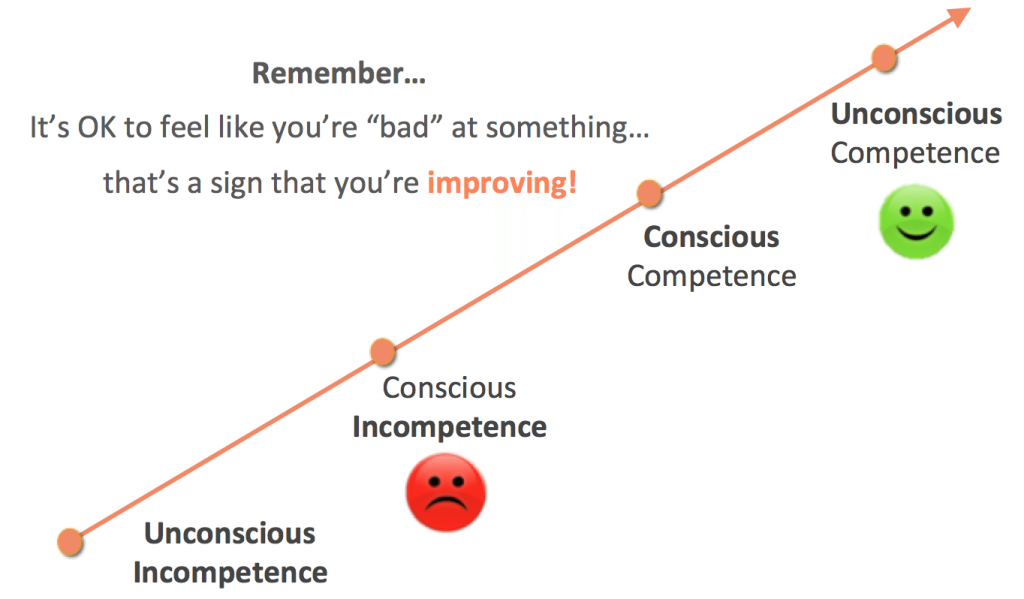Learning something new can be an exciting experience!
For most students, the excitement comes at the END of the process…once they’ve mastered the skill, and it starts to feel effortless.
But most of the time, when you’re learning something new it doesn’t feel so easy!
In fact, it often feels hard, confusing, and frustrating!
The fact that learning new skills is hard isn’t a problem…as long as students understand that it’s supposed to feel hard, and trust that eventually their efforts will be rewarded.
Unfortunately, many students have gotten the impression that learning something new SHOULDN’T be so difficult.
They believe they should be able to do well without working hard, and that mastering new skills should come easily and naturally.
Students with this expectation tend to get frustrated and disappointed when they’re not able to master something right away, and stop trying…concluding either, “I’m no good at this, so why try?” or “Who cares about this? It’s stupid anyway.”
One of the questions we like to ask students who are in this situation is whether they’re familiar with the Stages of Competence.
If they’re not, we show them the following diagram…


Stage 1: Unconscious incompetence
In the first stage of competence, students aren’t yet aware of how bad they are at this new skill…either because they haven’t tried it yet, because they haven’t received any feedback on their performance, or because parents or teachers are stepping in to rescue them before they experience any real consequences.
Stage 2: Conscious incompetence
At this point, students have tried a skill, and gotten enough feedback to realize that they aren’t very good at it yet. Unfortunately, many students treat this as an ending point, conclude “I’m no good at this.” and stop trying to improve. What they don’t see is that they’ve actually progressed to Stage 2 of the learning process, because they’re now aware of what’s going wrong and have valuable information they can use to get better.
Stage 3: Conscious competence
By this point, the student has taken steps to improve and develop their skill and they are starting to do well…but it still takes a lot of conscious effort to continue doing it correctly, and they’re not always able to maintain it 100% of the time.
Stage 4: Unconscious Competence
Finally, the skill is so ingrained and habitual that it is easy to do it correctly all the time without much conscious effort.
It’s like riding a bike…
Every student can relate to this process if they think about what it was like learning to ride a bike (or, for older students, learning to drive).
Before they ever tried riding a bike for the first time, they weren’t aware of how bad they were at it. (unconscious incompetence)
When they first tried riding, they fell off over and over again, and realized they weren’t very good at this! (conscious incompetence)
After some practice, they could ride successfully for short periods of time, but they still had to focus intently to avoid losing their balance. (conscious competence)
Now that they’ve truly mastered the skill, they can just hop on and go wherever they like without ever having to consciously pay attention to their balance, steering, or pedaling. (unconscious competence)

There are no shortcuts!
What we are trying to help students understand is that every new skill they acquire will follow the same process.
When we ask new students where on the diagram they are with the skill we’re beginning to work on (getting organized, studying for tests, etc.), they usually choose stage 2: conscious incompetence.
Students in this stage often feel discouraged, because they can see how badly they’re doing…but haven’t made much progress yet with improving their skills.
But when we look at the diagram, they can see that they actually HAVE made more progress than they’d realized…because just by becoming aware of the problem and focusing their attention on what they want to change, they have already moved from Stage 1 to Stage 2 of the learning process.
And as long as they keep moving FORWARD — in the direction of more self-awareness, learning, and growth, they will eventually achieve the effortless mastery they’re seeking.
But it’s a step-by-step process, and mastery isn’t going to happen all at once.
How you can help
Here are some ways you can support your kids, and help them continue to make progress towards mastering whatever skill they’re working on right now.
In Stage I: Build awareness
Help your kids become more aware of their current (lack of) skill in this area, by encouraging them to reflect on questions like…
- What are your goals? What skills will you need to achieve them?
- How would you rate your current skill in this area, on a scale of 1-10?
- How do you think your friends would rate your skill level? How about your teachers? Your coaches?
- What do you think it would take to get better at this?
In Stage II: Increase self-efficacy
Help your kids recognize that they have the power to change their situation and can get better over time if they keep working on it, by noticing and pointing out the small successes they are making, and asking questions like…
- What is in your control? What options do you have for how to handle this?
- On a scale of 1-10, how would you rate your skills in this area right now? What could you do to get to the next level?
- What progress have you already made?
- Who do you know who could help you get better at this?
- How is this similar to other skills you’ve mastered in the past?
In stage III: Encourage consistency
At this point, they’re going well with this skill when they focus on it…but they may still be dropping the ball when they take their eye off it. You can help your kids create more consistency with questions like…
- That was really well done. How could you remember to do it the same way next time?
- It seems like you do a really good job with this when _______. Have you noticed that, too?
- I’m impressed…you’ve done that every single day this week! What’s your secret?
In Stage IV: Celebrate their efforts
Celebrate how far they’ve come by expressing how proud you are of their efforts, and how exciting it is to see their hard work pay off. Help them internalize this lesson, by asking questions like…
- Remember what it was like when you first started learning this? You’ve really come a long way!
- What’s it like to see all your hard work paying off?
- When you first started out, what do you think you would have assumed if you had seen someone who’s as good at this as you are now? Would you have realized how much work they put in? Or thought they were just naturally good at this?
This goes for us, too!
We may think our kids should be able to keep track of all their homework, complete it without being reminded, and turn it all in on time without thinking about it.
But if they’re currently in Stage 1 or 2, there is no magic wand in the world that will allow them to skip straight to the effortless mastery of Stage 4 overnight. (If I find one, I promise I’ll let you know!)
Once we accept that there are no shortcuts, we can stop wishing things were easier, or waiting for a magic solution to arrive, and start focusing our attention on how to support our kids in moving to the next stage of competence…whatever that is for them.
By letting go of our own judgments about where kids should be, and accepting where they currently are, we can also help them get more comfortable with the fact that learning is a process. It’s OK to have some skills they’re not very good at yet, because there are always steps they can take to improve.
The improvements will take conscious effort and practice…and they won’t happen overnight.
But as long as kids stay focused on the skills they want to master, and keep working towards them a little bit each day, those skills will eventually feel as easy and natural for them as riding a bike.

Join 11,000+ parents helping their students earn better grades with less stress!

About The Author
Dr. Maggie Wray is a certified ADHD Coach & Academic Life Coach with a Ph.D. in Neurobiology and Behavior from Cornell and a Bachelor’s degree in Astrophysics from Princeton. She founded Creating Positive Futures in 2012 to help high school and college students learn how to earn better grades with less stress. Her team of dedicated coaches is on a mission to empower students to develop the mindset, organization, time management, and study skills they need to achieve their goals.
Related Posts
Other Posts You May Enjoy
How Does Your Teen Handle Failure?
How do you feel about failure?Most of us aren’t crazy about it. But at some point, no matter how hard we try, we’re going to fail at something. So, it’s important to consider how to respond to failure when it does happen, and how to improve our resilience so we’re...
Optimistic students earn better grades
Is your student more of an optimist, or a pessimist? Studies have shown that optimists experience a number of benefits later in life, as compared with their more pessimistic peers, including… Better test scores and higher GPAs Lower levels of stress, anxiety, and...
Starting before you’re motivated
Most students want to do well in school. But wanting to do well doesn't guarantee they will feel motivated to work on assignments in the moment. Even students who usually get good grades have days when they just don’t feel like doing homework or studying for their...




